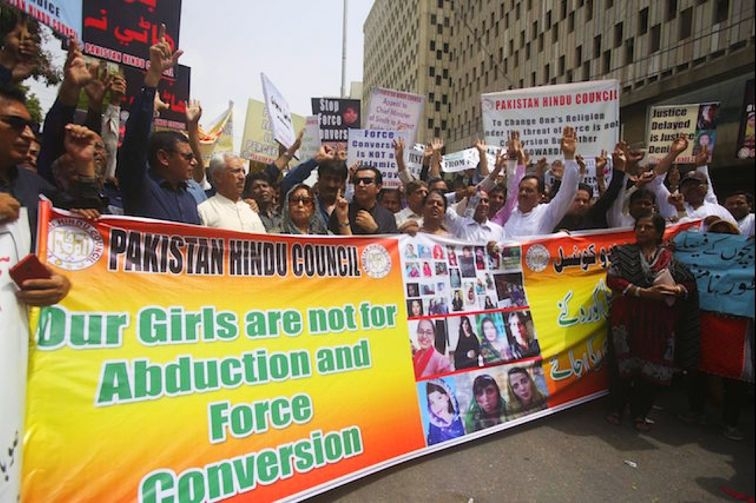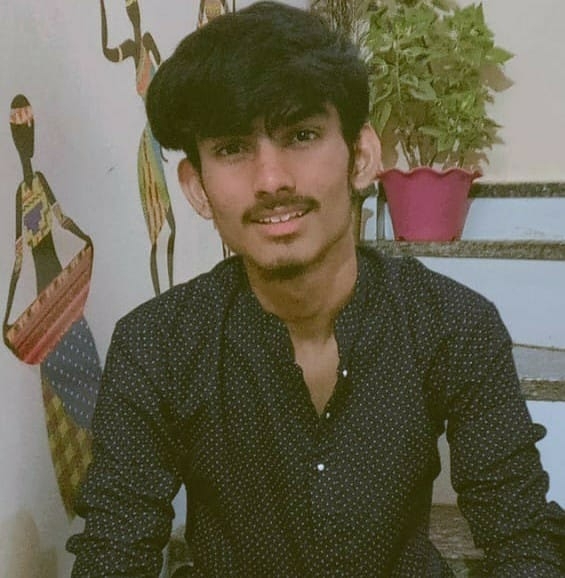Human Rights: A chimera in Islamic State
Islamic states which once conquered vast swathes of world on the extremities of violence, are now struggling their existence to remain in power. Punctuating its prowess with highly publicized beheadings, systematized sexual slavery, mass killings of religious minorities and other atrocities, Islamic states are witnessing a mass resistance against the administration, against the law, against Islam by its own citizens.

This is the second article in a series of five articles where we delve into a comprehensive analysis of human rights abuses occurring within communist dictatorships and Islamic regimes. In this article, we'll shed light on the impact of Islamic regimes, primarily in Pakistan and Afghanistan, where we examine how common people are affected and the multifaceted ways in which they experience exploitation, encompassing economic, social, cultural, and psychological aspects. Through this article series we'll uncover the realities and shed light on human rights violations in different contexts.
Islamic states which once conquered vast swathes of world on the extremities of violence, are now struggling their existence to remain in power. Punctuating its prowess with highly publicized beheadings, systematized sexual slavery, mass killings of religious minorities and other atrocities, Islamic states are witnessing a mass resistance against the administration, against the law, against Islam by its own citizens.
Ever since the Islamic rule has flourished in distinct lands, the Islamic administration has continued to violate human rights, commit crimes under international law , and disempowered the people with impunity.
[The state of human rights in the Islamic nations has witnessed the trails of criticism by their own citizens international human rights activists, writers and NGOs ; The United Nations General Assembly and the Human Rights Commission have also condemned the various extrajudicial proceedings there in Islamic States]
Afghanistan:
Since the American army left Afghanistan, the Islamic extremists (read terrorists) group Taliban again captured Afghanistan has closed the country’s political space ; opposition to Taliban is not tolerated , while women and minority groups have seen their rights curtailed by the new regime.
Restrictions on women’s rights, freedom of the media and freedom of expression increased exponentially. Institutions designed to support human rights were severely limited or shut down completely. Peaceful protesters faced arbitrary arrests,
Torture and enforced disappearance. The Taliban conducted extrajudicial executions, arbitrary arrests, torture and unlawful detention of perceived opponents with impunity, creating an atmosphere of fear.
Extreme poverty increased, exacerbated by drought and other natural disasters. Public executions and floggings were used as punishment for crimes such as murder, theft, “illegitimate” relationships or violating social norms. Women’s rights continued to be attacked, and women’s participation in public life was severely limited.
Afghanistan was the only country in the world where girls were banned from attending secondary school. Almost all institutions set up to address gender-based violence under the former government were shut down by the Taliban.
Freedom of expression, association and assembly:
The space for free media shrank drastically as the Taliban created an increasingly intimidating environment, forcing many media outlets to close.
Journalists faced growing restrictions including arbitrary arrest, unlawful detentions and torture in response to reporting that criticized the Taliban, leading many to self-censor.
Journalists were beaten and faced other forms of torture while detained. Many journalists fled the country. Women television reporters were forced to almost completely cover their faces.
The Afghan”stan Independent Human Rights Commission (AIHRC), the national human rights institution, remained closed, and the space for civil society organizations to document and report on human rights shrank significantly. Independent human rights groups were unable to work freely.
The Taliban arrested and unlawfully detained those who criticized the Taliban on social media, particularly Facebook.
The Taliban dismantled any space for peaceful assembly, demonstration or gathering. Taliban police used excessive and unnecessary force against demonstrators, and peaceful protesters were arbitrary arrested, detained, tortured and forcibly disappeared.
Detained protesters faced physical and psychological torture. Family members prevented female relatives from protesting out of fear of repercussions, further shrinking the space for freedom of assembly.
Women’s and Girls’ Rights:
The Taliban shut down the Ministry of Women’s Affairs (MoWA) and replaced it with the Ministry for the Propagation of Virtue and Prevention of Vice, which issued restrictive and abusive decrees on women’s and girls’ rights. Women who protested against these restrictions were met with unlawful detention and violence.
Girls remained barred from attending secondary school, and from December, from tertiary education. Previously, women attending universities were required to learn in gender-segregated classrooms wearing head-to-toe coverings, among other restrictions.
They faced difficulties registering for classes and the national university entrance exam and, in some instances, were denied entrance to university buildings, making higher education almost inaccessible. Women were also barred from studying certain subjects. By the end of the year, women and girls were only permitted to attend primary schools.
Women and girls were increasingly prevented from freely accessing other public spaces through various measures.
The Taliban imposed a dress code, required women to have a mahram (chaperone; adult relative to which the person can’t marry) to accompany them in public, and banned women and girls from public parks.
The Taliban announced that male relatives would be responsible for any violations of the restrictions by women and girls in their families.
This led to family members restricting the rights of female relatives out of fear of reprisals by the Taliban authorities. The Taliban cracked down on women who protested against these restrictions publicly or on social media, including through beatings, arrests, unlawful detention and arrests of family members.
Death penalty, torture, and cruel, inhuman or degrading punishments:
The Taliban began publicly executing and flogging people for crimes such as murder, theft, “illegitimate” relationships or violations of social norms. Between 18 November and 16 December(2021) more than 100 people were publicly flogged in stadiums in several provinces, according to UN human rights experts.
Pakistan:
Grave human rights violations are existent in the region since has been partitioned from India and have adopted Islamic laws for administration. Apart from the political upheaval and militarization in Pakistan the land shares major uncertainty with the future.
The Islamic authorities can be seen severely curtailing the right to freedom— harassing, arresting and detaining critics and political rivals as well as forcibly repressing protests and assaulting journalists, lawyers and human rights activists.
Blemishing of freedom and right of expression, religion, beliefs and even life is the structural quintessential in Islamic state.
Persecution of religious minorities:
Forced conversions of Hindu, Christians and Sikhs; Lack of justice for the victims of Non-muslim groups.
Religious minorities in Pakistan are treated as second class citizens, they don’t even have a mere right to exist there (as seen). Demolishment of their religious and cultural places has been so exacerbated that the religious minorities are not even left with the religious cultural history – in the land they once thought was there.
The Ahamdiya community which also identifies itself under the umbrella of Islam faces significant persecution and violation of religious and fundamental rights in Pakistan.
Ahmadiyas have been targeted and charged with various laws for using Islamic terminology, displaying Islamic verses or identifying as Muslims.
[The Pakistani constitution’s second amendment, implemented in 1974 declared Ahmadis as non-muslims and prohibited them from practicing Islamic rituals.]
The Hazaras of Afghanistan & Pakistan:
The Hazaras are an ethnic minority group in Afghanistan and Pakistan. In Afghanistan, they are primarily concentrated in the central province of Hazarajat.
They are predominantly Shia Muslims in a country where the majority of the population is Sunni. Hazaras have long faced discrimination and persecution, and their history is marked by a series of atrocities and human rights violations.
In recent years, the Hazara community has faced increased violence from extremist groups such as the Taliban and ISIS. In 2018, a suicide bombing at a Hazara protest in Kabul killed more than 80 people and injured over 150. The Taliban denied responsibility for the attack, but ISIS claimed it.
The Hazaras have also been the targets of kidnappings, torture, and killings by both the Taliban and ISIS. In 2020, a group of Hazara men was abducted from a bus in Zabul province and later found dead. The Taliban claimed responsibility for the attack, stating that the men were members of a pro-government militia.
The same year, ISIS claimed responsibility for an attack on a Hazara ceremony in Kabul that killed 32 people and injured 80 others.
Human rights violations against the Hazaras in Pakistan have been reported by international human rights organizations, including Amnesty International and Human Rights Watch.
The Hazara community faces discrimination in access to education, employment, and healthcare, with Hazara children often subjected to bullying and harassment at school. Hazara women and girls face particular challenges, with high levels of illiteracy, poverty, and domestic violence.
In addition to facing violence and discrimination, the Hazaras in Pakistan are also targeted by extremist groups such as the Lashkar-e-Jhangvi (LeJ), who consider them to be heretics. The LeJ has claimed responsibility for many of the attacks on the Hazara community in Pakistan, and its leaders have been implicated in the killings of Hazaras.
Despite some progress towards greater recognition of Hazara rights in Pakistan, the community still faces significant challenges, including ongoing violence and discrimination.
The situation is further complicated by the political and security situation in Pakistan, with the government struggling to maintain control over extremist groups and sectarian violence.
It can be concluded with every proceeding there( Pakistan & Afghanistan) , that the use of torture and other I’ll treatments have remained a routine in Islamic states.

contemplating society and politics through cultures

